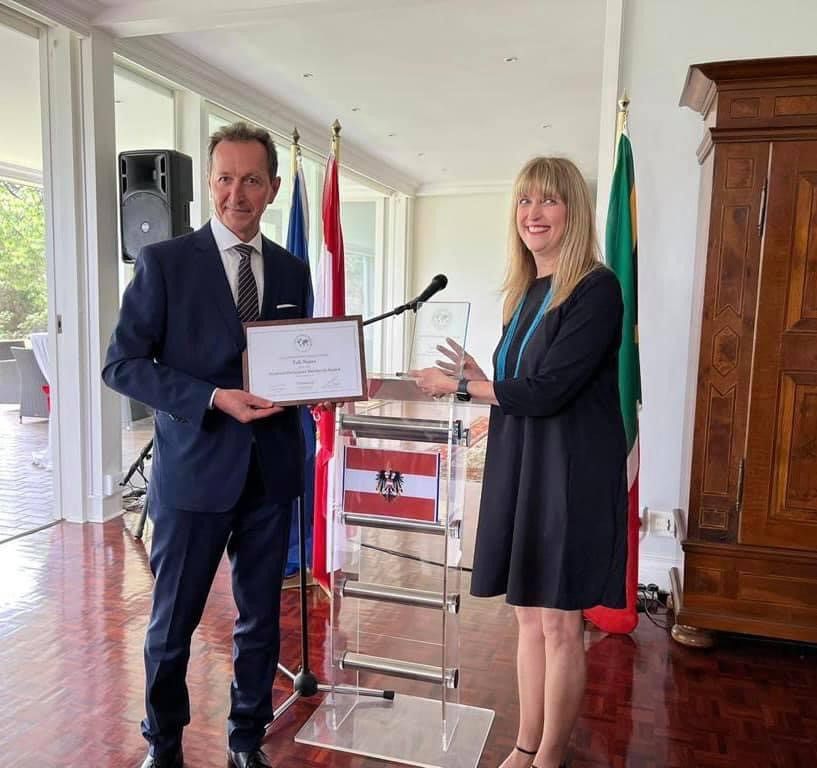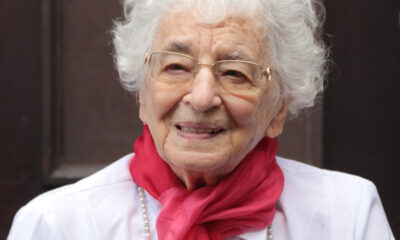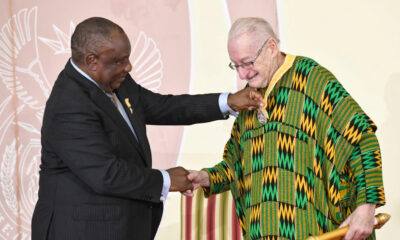
Community

Austria awards Nates for Holocaust work
Tali Nates, the founder and director of the Johannesburg Holocaust & Genocide Centre, gives her all to keep the memory of the Holocaust alive, and educate people about genocide. It’s generally a thankless task, but this week, Austrian Ambassador Dr Johann Brieger presented her with the Austrian Holocaust Memorial Award.
Nates is the first South African to win this award and, as the daughter and niece of Holocaust survivors saved by Austro-Hungarian Oskar Schindler, it’s particularly meaningful for her.
“I’m honoured to be the first South African to receive this award. However, it’s not mine alone, it goes to all the members of the team at the Johannesburg Holocaust & Genocide Centre,” she said.
In her acceptance speech, Nates spoke about the projects in which she has partnered with the Austrians, saying, “It’s important for us in South Africa and the centre to interact with the particular history of Austria during and after World War II and its struggle, especially from the 1990s, to confront its difficult past and the progress, and meaningful steps taken to come to terms with it in the country today.
“I feel a particular kinship with this process as 27 years after the end of apartheid and the transition to democracy in South Africa, we also struggle to confront our own painful past, and to a large extent, it still shapes our country’s present and future.”
Brieger spoke of Austrians’ responsibility to remember and obligation to act, describing “small steps” that Austrians had implemented to educate not only future generations but to engage in discussion with the older generation. “It’s a responsibility and an obligation at the same time,” he said.
“It was thus easy when I was asked during the selection process what I thought of honouring Tali with this award. I couldn’t think of anyone better suited. This is what you do. You do it with vigour and passion, and in a very nice way,” said Brieger.
Adam Mendelsohn, the director of the Kaplan Centre for Jewish Studies and Research at the University of Cape Town, said, “In South Africa, no individual has done more to make the Holocaust meaningful, relatable, and urgent than Tali Nates.”
As Nates had demonstrated again and again through her work, it’s precisely because the Holocaust is so little known, so unfamiliar, and so distant from a simplistic South African way of seeing race as only black and white, that it’s so powerful here, Mendelsohn said.
“Precisely because it’s so distant from the lived experience of South Africans, it provides a particularly good tool to think with, a particularly productive way of speaking about our own problems in South Africa, and a particular challenge to the easy expectations and assumptions of a South African audience,” Mendelsohn said.
“When taught by Tali, the Holocausts demands humanism and empathy. We live in a society that doesn’t empathise easily. Engaging with the Holocaust demands that we relate to one another as individuals, fragile and imperfect, fallible and susceptible, capable of great good but also callousness, indifference, and evil,” said Mendelsohn.
He said Nates’ work in Holocaust education here and abroad made a genuine difference. “Hers isn’t the flashy and attention-seeking style that too often passes for making a difference in our popular culture. This is the real thing: the patient and persistent work of nudging society, person by person, to be better, more understanding, to recognise our common humanity,” Mendelsohn said.
“And to me, all that Tali does serves another quieter purpose too. We can never fully grasp the destruction of the Holocaust, and we can never derive redemptive meaning from it. But through the care, thought, and energy of Tali and others like her, the Holocaust can be used for good.”
By doing what Nates does, he said, “We don’t allow the victims of the Holocaust to be forgotten, a second death for the countless numbers who have none to mourn for them. Instead we honour the dead, and let their suffering and their lives speak in the present. Such noble and important work is worthy of our gratitude.”










